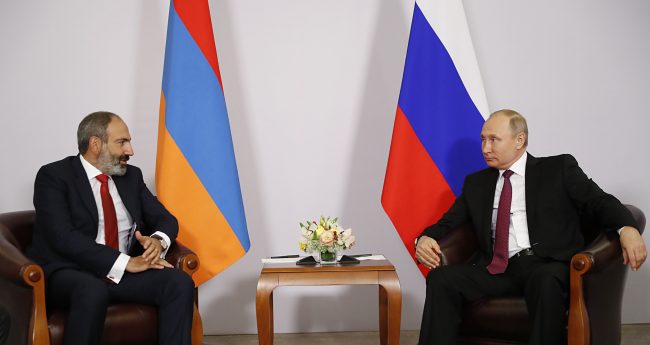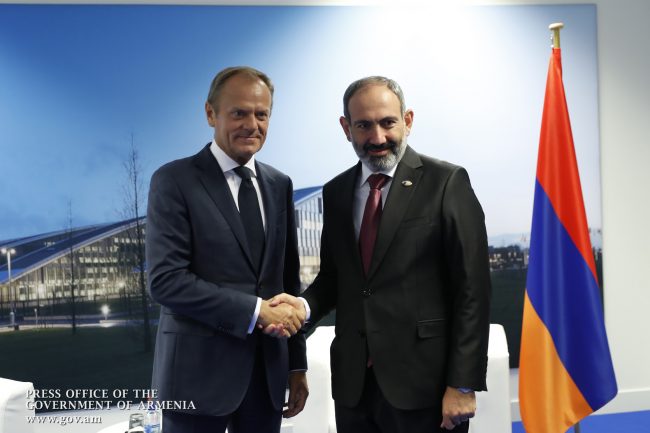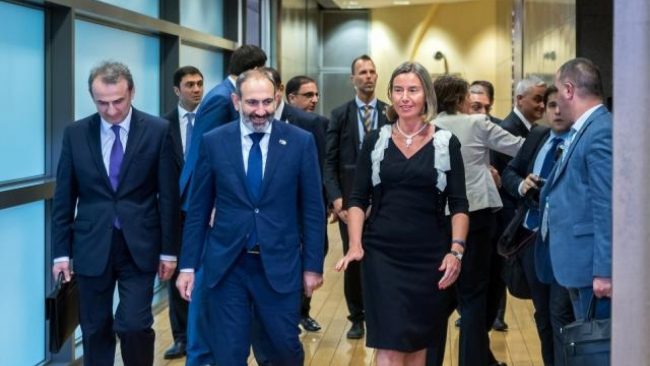


Armenia has for decades pursued a so-called ‘multi-vector’ foreign policy, maintaining its security agreement with Russia while securing funding from the West. But now that real democratic change is occurring, will the government of the ‘New Armenia’ be able to maintain the balancing act?
When it comes to post-Soviet countries, conventional wisdom in the West states that democratic reform can only come coupled with a pro-Western geopolitical orientation, while allying with Russia most likely means authoritarianism and corruption. In Russia, on the other side of the new ‘iron curtain’, the widespread view is equally black and white: ‘democracy’, ‘human rights’, and ‘anti-corruption’ are nothing but tools in the West’s geopolitical struggle against Russia.
The success of Armenia’s Velvet Revolution has challenged these assumptions. As the new Government of Armenia forges its own foreign policy, it continues to challenge these deeply held convictions, both in the East and in the West.
It could be argued that this approach is not new, as it has been the basis of Armenia’s ‘complementarism’ or ‘multi-vector’ foreign policy for years. But for previous Armenian governments, buzzwords like ‘democracy’ and ‘the fight against corruption’ were largely a matter of rhetoric.
In practice, authoritarianism and corruption became deeply entrenched, even as the EU and other international organisations allocated funding for democratic reform and anti-corruption campaigns. Armenia’s previous governments seemed to reach a nearly immaculate level of sophistication in covering up corruption and authoritarian practices.
This smokescreen was lifted by the Velvet Revolution. The fact that a political party was swept away by protests in a matter of weeks, after having supposedly received majority support in Armenia’s 2017 election, exposed the reality of the country’s widespread electoral manipulation. The ensuing anti-corruption campaign has uncovered corruption to an extent that even activists in the field had hardly anticipated.
Against the backdrop of these revelations, the revolutionary drive of Armenia’s new government has put both the EU and Russia in uneasy positions. Before the revolution, it was obvious to outside observers that Serzh Sargsyan’s geopolitical manoeuvres meant little in regards to the genuine transformation of Armenia’s political or economic systems. This allowed Brussels to channel a relatively moderate level of aid to Armenia while focusing the brunt of its efforts on those Eastern Partnership members with a perceived commitment to both reform and geopolitical alignment with the West.
At the same time, Moscow could remain relatively calm about Yerevan’s relationship with Brussels, as it saw Serzh Sargsyan as completely predictable and manipulable.
Today, however, Armenia is led by a government that affirms its commitment to an alliance with Russia while also setting out on an ambitious programme of transformation along the lines of ‘democratic values’. It seems that neither Moscow nor Brussels is entirely sure how to react to the situation, which is thus far unprecedented in the post-Soviet space.
Sovereignty above all: the new government’s Russia strategy
In its foreign policy, Pashinyan’s government is prioritising the restoration of Armenia’s full sovereignty in its dealings with both the East and the West.
Before the revolution, Pashinyan and his allies would often accuse Sargsyan’s government of an inability to maintain an equal and dignified partnership with Russia. This criticism often led outside observers, especially those in Russia, to label Pashinyan a ‘pro-Western’ politician and to view his talk of ‘sovereignty’ as a euphemism for rapprochement with the West.
While some of Pashinyan’s allies — particularly in Edmon Marukyan’s Bright Armenia Party — have indeed expressed attitudes that could be seen as ‘pro-Western’, Pashinyan’s own approach has been somewhat different. He has always stressed that his vision is ‘Armenia-centred’ and that the his highest priority is ‘Armenia’s sovereignty’. It was from this point of view, rather than a ‘pro-Western perspective’ that he criticised Sargsyan’s policies toward Russia. These details, however, tend to get lost in the bigger picture.
To be fair, Sargsyan was hardly a ‘pro-Russian’ leader either. Moscow suspected him of double-dealing as he pursued the normalisation of relations with Turkey and the Association Treaty with the EU. Moreover, Sargsyan, whose first presidential term coincided with Dmitry Medvedev’s presidency, apparently failed to forge a successful relationship with Vladimir Putin. Nevertheless, as an archetype of the political elite in the post-Soviet republics, cultured by Soviet nomenklatura and mired in allegations of corruption and nepotism, Sargsyan was easy to read and to influence. He may have been unpleasant for Moscow, but he was predictable.
Pashinyan is an entirely new type of a leader, one that Russia has never dealt with before. No matter how often he reiterates the importance of the Russian–Armenian friendship, he is likely to remain suspicious to many in Russia’s elites. At the same time, members of his team have qualities that are raising the eyebrows of those within the Russian elites: some went to Western universities, some belong to Western countries’ diaspora communities, and some previously worked in NGOs, including international organisations that are viewed in Russia with extreme suspicion. Considering also that many Russian elites have connections to either the former Armenian government or — more dangerously for Pashinyan — the Azerbaijani government, it becomes clear that Pashinyan’s team faces major challenges in building relations with Moscow.

Panic in Panik
Nevertheless, the relationship between Moscow and Armenia’s new government has been largely constructive so far. Pashinyan visited Russia almost immediately after being elected prime minister, during the EAEU Sochi summit on 14 May. Less than a month later, he travelled to Moscow to attend the opening of the Football World Cup. Both times, he met with Vladimir Putin. He also met with Russian PM Dmitry Medvedev and had an informal dinner with the editor-in-chief of Russia Today, Margarita Simonyan, who is also of Armenian origin. In these meetings, Pashinyan reportedly spoke of his commitment to both Armenia’s security alliance with Russia and economic cooperation within the framework of the EAEU, but also stressed that Armenia–Russia relations must be based on mutual respect for national sovereignty.
Overall, the tone of the Russian media on the Armenian protests, and later on the new government, has been mostly neutral, at times even sympathetic. There have been several notable exceptions, however. The most high-profile of these was a talk-show that hosted well-known Russian journalist Mikhail Leontyev, currently the vice president and PR chief of oil giant Rosneft. Leontyev and others on the show made a series of offensive statements about Armenia and Armenians, prompting not just an Armenian media storm, but an official complaint from the Union of Armenians in Russia and the Armenian embassy in Moscow. Leontyev apologised, demonstrating that the Russian perception of the situation in Armenia is quite different from that of Ukraine.
Elsewhere in the media, Pashinyan seems to be the new favourite of two (in)famous Russian ‘prankers’, known as ‘Lexus and Vovan’, who have posed as Pashinyan to trick several European leaders. Their first victim was Boris Johnson, then UK Foreign Secretary, and more recent victims have included European Commission President Jean-Claude Juncker and EU High Commissioner Federica Mogherini. The EU leaders were likely the prankers’ intended targets, rather than Pashinyan, but publication of the recordings nevertheless contributed to the uneasiness in Armenia–Russia relations.

A recent series of events gave Russia an outlet to express its discontent with Yerevan’s policies. Apart from several critical articles in the Russian media, which could have been dismissed if in a different context, there was also a more serious incident: the Russian military caused panic among Armenian villagers with an unannounced military exercise just outside the incidentally-named village of Panik.
Pashinyan strongly condemned the Panik incident as ‘a provocation against Armenia’s sovereignty’. In response, supporters of the previous government, such as the former ruling Republican Party vice-chairman, Armen Ashotyan, accused him of overreacting. On 23 July, a telephone conversation took place between Pashinyan and Putin. While its official purpose was to address ‘issues of Eurasian integration’, it’s possible that the true objective of the conversation was to resolve the current disquiet in Armenian–Russian relations. The outcome of this conversation, be it positive or negative, will probably become clear soon.
Pashinyan’s assertive tone was a break with his predecessor’s policy — if not in essence, at least in style. Sargsyan generally refrained from any public criticism of Russian military actions in Armenia, even in the wake of the tragic 2015 incident in which a Russian soldier left the Gyumri base and murdered seven people, including five children. Sargsyan’s government preferred to relegate criticism of Russia’s actions to the media, opposition, and experts, while simultaneously asserting its loyalty to the Russian leadership.
Judging from the lack of support Sargsyan received from Moscow during the revolution, this tactic did not pay off. It remains to be seen whether Pashinyan’s more straightforward approach will complicate things with Moscow or, conversely, help to build a more equal relationship. Notably, Belarus’ Lukashenka has criticised Moscow even more harshly in the past, yet his relationship with Russia has suffered only temporary setbacks.
Democratic change without geopolitical realignment?
While Pashinyan’s trip to Sochi was a chance to meet the post-Soviet leaders, his trip to Brussels was about meeting the leaders of the Western world, along with top EU and NATO officials. Pashinyan’s time in Brussels demonstrated again that the new government’s foreign policy has the same strategic priorities as the previous government, but with a new style.
As in his relations with Russia, Pashinyan seems more confident and more ambitious in asserting Armenia’s interests. Straying from the usual diplomatic niceties, Pashinyan — both in Brussels and after returning to Yerevan — expressed his disappointment that the EU ‘has failed to notice’ the immense changes going on in Armenia with the revolution. He also said that he viewed democracy as a firm belief, rather than a geopolitical orientation, making clear the distinction.
The question is whether this view will be met with understanding in Brussels. The EU ambassador to Yerevan, Piotr Świtalski, reacted to Pashinyan’s comments by saying half-jokingly that if Armenia’s policy toward the EU is static, then why should EU policy toward Armenia change? He added immediately, ‘speaking seriously, we need specific ideas and specific expectations, which we are ready to discuss’.
Eventually, it seems both sides came to an understanding, and Pashinyan’s press secretary announced that the Armenian government would come up with a plan for an appropriate EU funding package.
While the EU may eventually accept the principle of disentangling geopolitics from democratic change, the concept may be a more difficult sell to the Russian leadership.
Yerevan also faces the difficult task of maintaining cooperation with NATO without angering Moscow. In Brussels, Pashinyan confirmed Armenia’s continued participation in NATO peacekeeping operations. He also repeated in an interview to Euronews that Armenia would remain a close ally of Russia, even as it continues to develop relations with NATO.
In fact, Pashinyan’s policy toward NATO is remarkably similar to Sargsyan’s, but even during the former presidency, Russia showed signs of irritation over Armenia’s cooperation with NATO, mostly via experts and the media.
Further tension cannot be excluded, especially as Armenia considers whether to participate in the Noble Partner NATO military drill scheduled to take place in Georgia in August. Armenia was supposed to take part in similar drills last year, but cancelled at the last minute. At a recent press conference, Pashinyan said that no final decision on Armenia’s participation in the drill had been made.
If there is one overarching theme of the actions of the new government, it is the idea that policy should be based on a respect for Armenia’s sovereignty and dignity. Given the political context of the revolution, this seems to make sense. A government that claims to have reaffirmed the sovereignty of its citizens now wants to do the same for its foreign relations.
Armenia’s government seeks to reaffirm the country’s sovereignty while maintaining a security alliance with Russia and securing aid for democratic reform from the West. This may seem like a nearly impossible task. And yet, only a few months ago, so did a change of government in Armenia.








